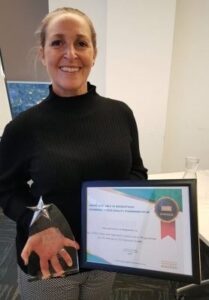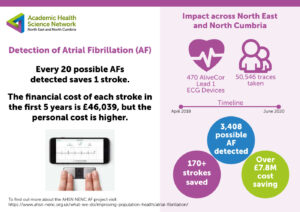Opportunistic Pulse Checks using AliveCor
Project Lead: Nikki Holdsworth
Pulse checks can detect people with undiagnosed Atrial Fibrillation (AF), so they can be identified and treated for their condition. Implementation of the AliveCor device across the North East and North Cumbria region aims to help to find these patients.
‘It’s not just heart rate but heart rhythm!’
Our award-winning programme has demonstrated the following benefits (click the image below to expand):
- The AliveCor project results for NENC and the results for the national AF Detection project can be found in the project report Download AliveCor Project Report NENC
- A national webinar “Cardiovascular disease – how new technology can revolutionise prevention.” was held in July 2020 chaired by National Clinical Director for CVD Prevention Dr. Shahed Ahmad with AHSN NENC Project Lead Nikki Holdsworth joining the panel along with Dr Yassir Javaid Cardiovascular and Diabetes Lead at Nene CCG, Cardiovascular lead at East Midlands Clinical Network, and Clinical Adviser for Cardiology with RCGP). The full webinar can be viewed by following this link Watch a recording of the webinar
- Winners of the Anticoagulation Achievement Award for, “Centre Best Able To Demonstrate Adherence To NICE Quality Standards for AF.”

What is AliveCor?
AliveCor is a small, simple, NICE approved handheld device comprising of two pads which, when pressed by the patient, records a single lead rhythm strip; this takes only 30 seconds to use.
AliveCor works in conjunction with a free App which is downloaded onto a mobile device (phone or tablet). No patient identifiable data is stored.
Anyone working in healthcare can use AliveCor, including GPs, Practice Nurses, Healthcare Assistants, GP Receptionists, Community Pharmacists, Specialist Nurses, Podiatrists and many more.
- A 1-lead rhythm strip indicating whether the patient has a normal or abnormal heart rhythm
- The flexibility to save and share results by email and download into the notes of a patient
- Specificity rates up to 97% (compared to 60-70% for traditional methods)
- Sensitivity rates are above 85%
- Potential to increase Quality and Outcomes Framework (QoF) payments by helping to find patients with AF
- 100+ hours of use so no need for charging.
“‘I regularly use AliveCor as part of my routine appointments. I have found it very useful during health checks, CVD assessment and hypertension reviews. The device is very easy to use and I have picked up otherwise undetected AF which is now being treated successfully.”
Clare O’Neill, Practice Nurse, Park Parade Surgery, Whitley Bay
Using AliveCor in your practice
- Obtain your AliveCor device and supporting documentation all available to download here
- Download the free Kardia app (App Store/Play Store)
- Create an account using your nhs.net email address
- Watch the AliveCor training video below on how to use the device
For information: EMIS read code: ESCTEL2 – mobile ECG screening
SYSTM1 read code Y18d5 – mobile ECG screening
This video has been developed to help and support healthcare professionals who have an AliveCor device.
Please contact [email protected] to find out more
Does AliveCor need WiFi and Bluetooth?
AliveCor (single-lead) emits high frequency sound waves and pairs with an app on a smart device. Bluetooth is not needed for the single-lead AliveCor. WiFi or 4G is only needed when the app is first downloaded on the smart device, and we would recommend connecting to WiFi or 4G once a month for back-up purposes. If a practice does not have WiFi it would not exclude them from using AliveCor.
Does AliveCor only work on an iPhone?
AliveCor works with all smart devices except Microsoft and Amazon. The app is downloaded from the App Store or Google Play Store.
Will using AliveCor mean patient information is stored on phones and devices?
No, patient information is not stored on your phone or tablet, and we do not recommend that you add any, as this is not necessary. The rhythm trace taken, which needs to be emailed onto another clinician has to be done immediately. Once you come out of the app all data is lost. No patient data is added to the app.
Will I need to use my own phone when using AliveCor?
Not necessarily. This will depend upon your practice and how they wish to use AliveCor. AliveCor can be used with personal phones and most people do use their own phones, but some practices have purchased a cheap smart device or a member of staff donates an old handset which is no longer used at home (this needs to be reset to factory settings to remove any personal data prior to the practice using it) and set up with a practice account.
Will using AliveCor create more demand for ECGs?
Practices who are already using AliveCor have reported a decrease, not an increase, in referrals for 12-Lead ECGs in those patients who have no symptoms and are having a pulse check to examine their rhythm. These asymptomatic patients who have an irregularity in the pulse are currently all referred for a 12 lead ECG, whereas some will be identified as having a normal rhythm using AliveCor avoiding the need for a 12 lead ECG to obtain this information. AliveCor is highly specific, with a specificity over 90%, allowing you to confidently identify patients who do not have AF – and highly sensitive, with a sensitivity above 85%, ensuring you can reliably identify patients with AF. Patients who have symptoms will be referred for a 12 lead ECG as they are now, and there will be no change in those numbers (although an AliveCor may still be done, as a way of immediately obtaining a rhythm assessment, pending the result of the 12 lead ECG). Current usage data from across NENC shows that an estimated 65% – 70% of AliveCor readings are ‘normal’ and no further action is required.
What about speed of response, if I find something abnormal?
If AliveCor detects an abnormal pulse, you follow the same pathway as if you found an irregular pulse through a manual check.
How can I use the AliveCor?
Practices use them in a variety of ways and here are some examples: flu clinics, LTC clinics, vascular reviews, home visits, care home visits, health checks or when presented with the opportunity to pulse-check a patient.
Is there any further information?
- NICE Technologies Appraisal, 8th May 2019 – https://www.nice.org.uk/guidance/dg35/resources/leadi-ecg-devices-for-detecting-symptomatic-atrial-fibrillation-using-single-time-point-testing-in-primary-care-pdf-1053752401861
- NICE Medtech Innovation Briefing (MIB): MT551 KardiaMobile for detecting atrial fibrillation – web address to be confirmed when released.

